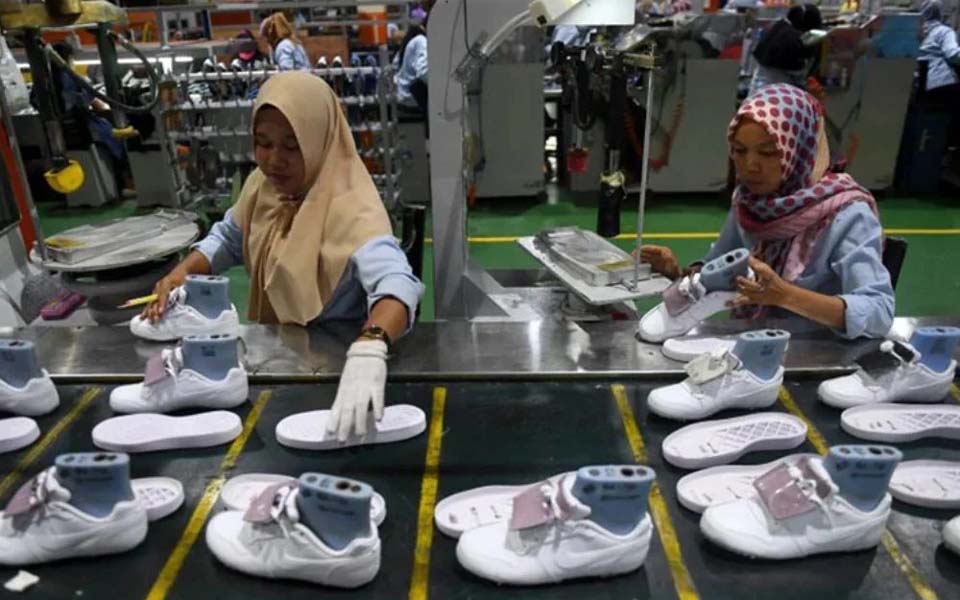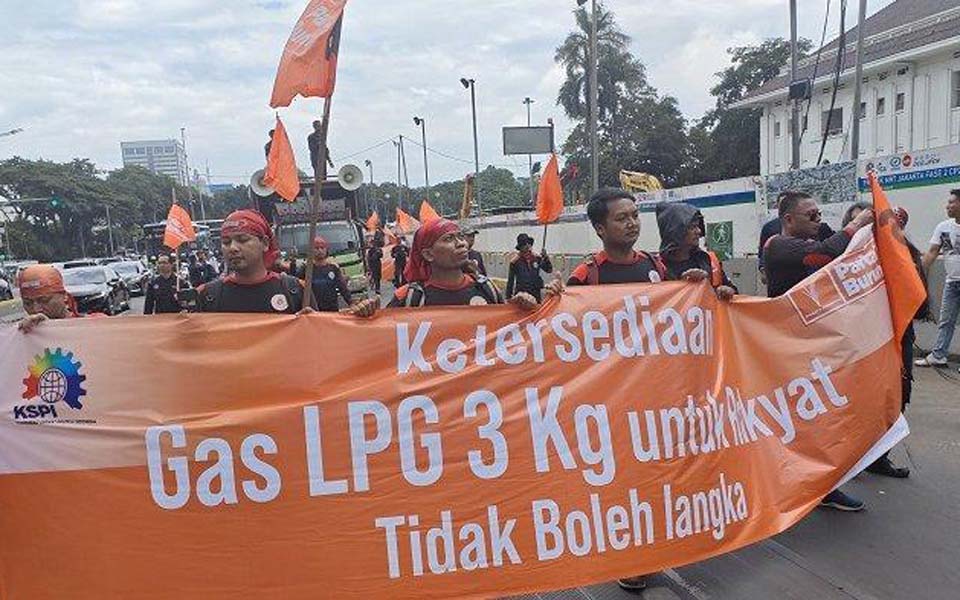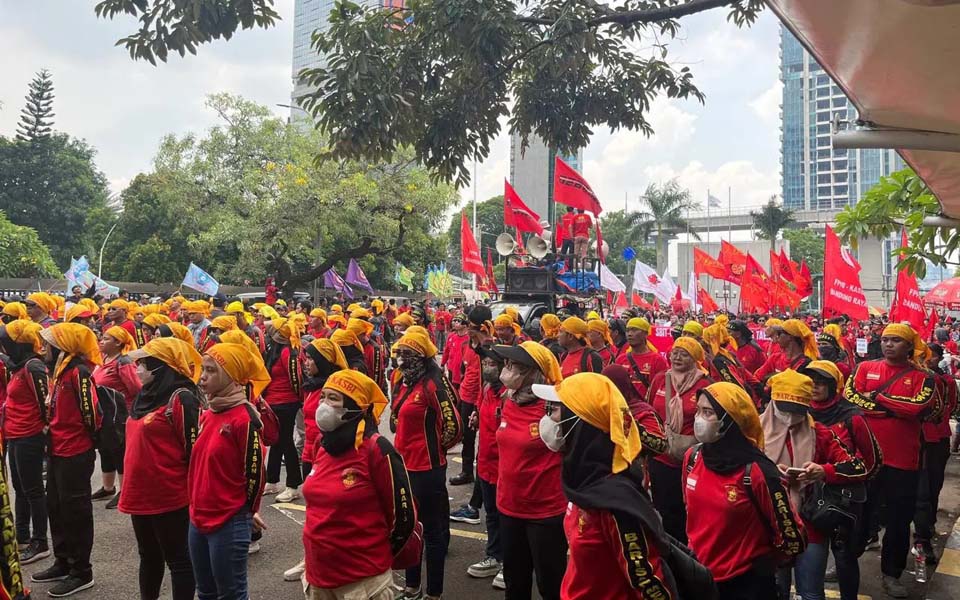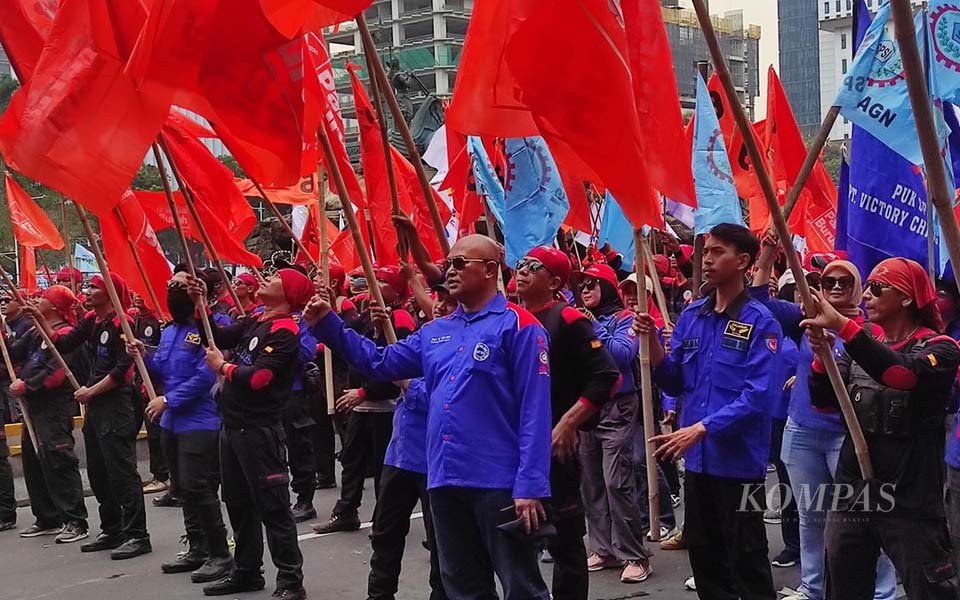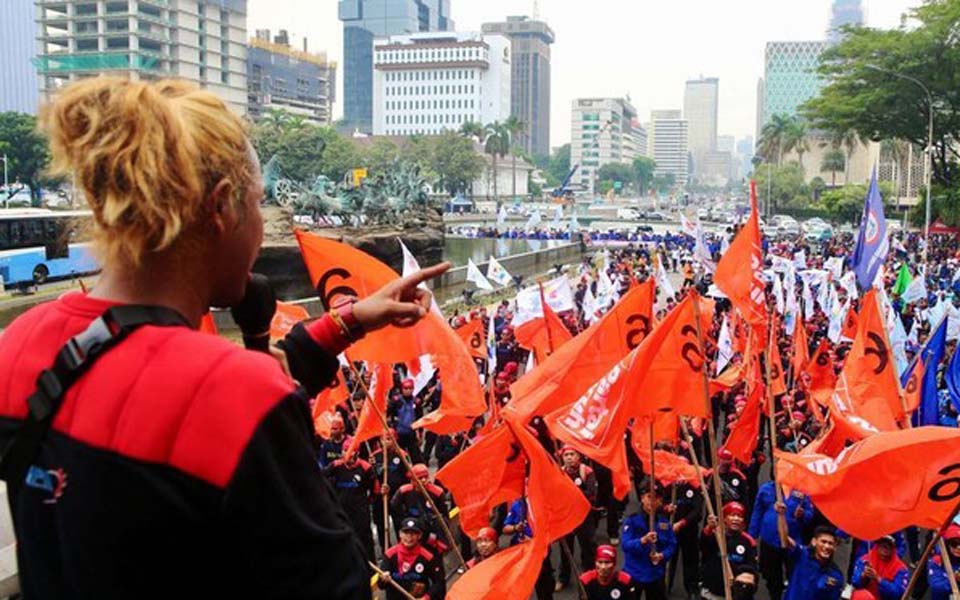Khairina – The narrow lane in Rawa Terate, Pulo Gadung, East Jakarta, was dirty and suffocating that afternoon. Less than half-a-meter wide, the lane was filled with housewives sitting around and gossiping, young children crying and a small herd of goats.
The muddy dirt lane piled with rubbish gives off an unpleasant smell. The area is indeed not fit to live in. “[We] clean it up but it still looks shabby”, said Eni, who has lived there for many years.
In rows along the narrow lane are simple terrace houses with earthen floors, walls made of cheap brick and no bathrooms. And when it rains, the houses flood. Living in these terrace houses are hundreds of factory workers employed in the Pulo Gadung industrial estate.
The rent for a terrace house measuring some 5x6 metres square, partitioned into two rooms, is as much as 250,000-300,000 rupiah a month. For a more “luxurious” house, with a ceramic floor and bathroom, the rent is 400,000-500,000 per month. But with a monthly wage that is only equivalent to the Jakarta minimum regional wage (UMR) of 972,604 rupiah, they are forced to contract whatever house they can find.
Life as a worker does not provide them with many alternatives. With the recent steep increases in the price of basic commodities, workers have had to tighten their belts yet again in order to survive. Moreover in a situation where many companies have reduced production, they are no longer able to rely on overtime pay. “Right now he’s lucky not to be sacked”, said Eni, whose husband works at a furniture factory.
With her husband’s income of only around 1.5 million rupiah per month, Eni has to wrack her brain to fulfil all of her family’s needs. In addition to paying the rent on the house and electricity, Eni must also pay for her two children to attend primary and junior high school. Because her husband’s wage is simply not enough, Eni limits her spending to a maximum of 20,000 rupiah per day.
Before the recent price hicks, this would have been enough to feed the family for two days. Now, with 20,000 rupiah Eni can only cook rice, vegetable soup and tempeh. “Kerosene has now reached 7,000 rupiah per litre. Onions are now 1,000 rupiah, and that only gets five bunches”, she complained.
Eni’s family no longer eats beef or chicken. She makes soymilk for sale in roadside stalls in order to supplement the family’s money for daily necessities. Every two days Eni makes a profit of 20,000 rupiah.
“It helps out a bit. But, this year I won’t going home to my village to celebrate the Lebaran holidays [at the end of the fasting month] because it’s absolutely impossible to save anything”, said Eni, who originates from Salatiga in Central Java.
Contract labour
Although life is difficult, Eni’s is fortunate compared with Suparmi and Yeti. Their contracts at a swimwear export factory will not be extended after May. The Korean company is purportedly receiving few orders and has been forced to lay off employees.
Suparmi, who has worked their for four years, and Yeti, who has worked at the factory for one-and-a-half years, only have their contracts extended for three months at a time. They receive a wage in accordance with the Jakarta UMR but do not get any other entitlements such as healthcare or food allowance.
With an income that is barely enough to survive on, Yeti can only send what little money is left to her family and child in Magelang, Central Java. Suparmi meanwhile lives with her husband, who is also a factory worker, and her two children in Rawa Terate. “Perhaps II’ll return to my home village for a bit. Later I’ll try sending an application letter to another factory”, said Yeti.
Since the rise in the price of basic commodities, Yeti economises by no longer buying food from roadside stalls because the price is just too high. A bowel of beef soup that used to be 5,000 rupiah for example, now costs 8,000 rupiah. A piece of fried chicken, that used to be 3,000 rupiah, now costs 5,000 rupiah. “But now, even if you want to cook it’s the same because the price of kerosene and cooking oil is so expensive”, complained Yeti.
Suparmi meanwhile, in order to economise, has in fact chosen not to cook proper food anymore. This afternoon for example, Suparmi only cooked instant noodles for her children’s lunch. But because she has a child under five, it’s difficult for Suparmi to cut down on snacks. Because of this, and rather than have her child whimpering all the time, she has resigned herself to using money for basic necessities to buy children’s snacks.
“My kid doesn’t yet understand that their mother doesn’t have any money. Forcing me to sacrifice money for daily necessities for sweets,” she said.
Increases living costs became even more difficult when public transport fares increased, even though the price of petrol had not yet gone up. Transport costs from Rawa Terate to Pulo Gadung, which used to be 1,500 rupiah, have now risen to 2,000 rupiah.
Target based work
According to Suparmi, signs that the swimwear factory was not getting enough orders were already apparent several months ago. Workers are now being asked to work according to targets, not by the hour as they did in the past. Even after working hours are over, they must still continue working if the target has not been met. Thus the company no longer has to pay overtime.
As a consequence, many employees are working long hours. They start work in the morning and return home at midnight. “We’re really very exhausted. But, what else can we do, we don’t have any choice”, said Suparmi.
In addition to many factories closing down, companies are also moving their factories to the countryside, to areas such as Cikarang in West Java or Central Java. The reason for this is that the UMR in other regions is far lower than the UMR in Jakarta. “In the end many workers also move to Cikarang or chose to return to their home villages. As a result, a lot of boarding houses here are empty,” said Eni.
Although life in Jakarta is more difficult, the three women said that they did not wish to return to their villages. For them, life in rural areas is even far more difficult. “Even supposing that there is work for us, perhaps we would not be able to survive there. But, what else can we do”, said Eni.
[Translated by James Balowski.]







